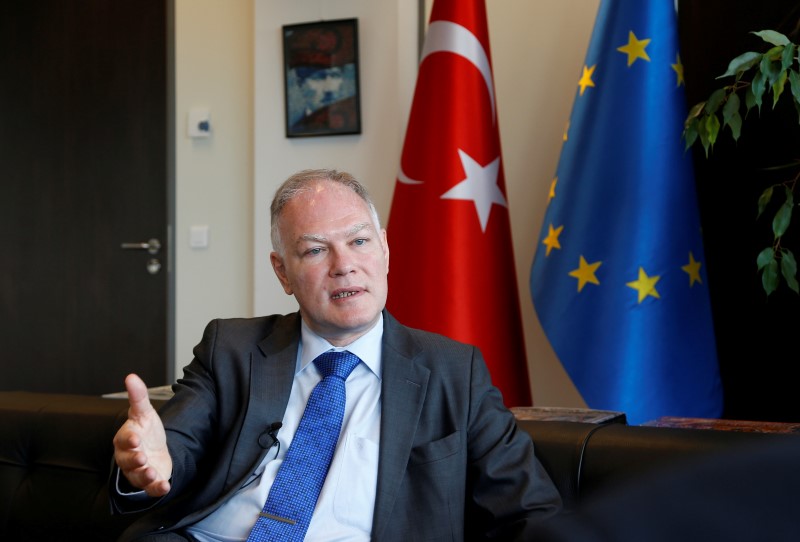By Francesco Guarascio
BRUSSELS (Reuters) - The European Union and NATO remain Turkey's key partners despite its rapprochement with Russia, and differences with the EU on the application of a deal on migrants can be soon ironed out, Turkey's ambassador to the bloc said on Wednesday.
Career diplomat Selim Yenel, in an interview with Reuters, said Ankara was ready to change its anti-terrorism law, as requested by Brussels, and might not reintroduce the death penalty, a move EU leaders say would end talks to join the bloc.
"Nothing has changed," Yenel said, dismissing Western concerns that a meeting between Turkish President Tayyip Erdogan and Russia's Vladimir Putin might signal a shift in Turkey's foreign policy towards Moscow.
Erdogan met Putin on Tuesday near St Petersburg in the Turkish leader's first foreign trip since a failed military coup on July 15-16 and a crackdown which has strained Turkey's relationship with the United States and Europe.
NATO on Wednesday issued a statement saying that Turkey's membership of the U.S.-led military alliance was not in question.
Yenel sought to reassure European partners over the March refugee deal that ended the flow of migrants into Europe from Turkey but which the Turkish authorities have warned may collapse if the EU does not allow visa-free travels for Turkish passport-holders.
Before conceding visa liberalisation, Brussels wants Turkey to soften the anti-terrorism law, a tall request for Ankara particularly after the failed coup.
Yenel sought a more conciliatory tone. "We have not said we are closing the door. We have said that if the changes requested do not prevent our fight against terrorism, then we can look into it."
On talk of the death penalty being restored in Turkey, he said this was "only a discussion" triggered by people's anger after the failed coup. "The EU is jumping the gun prejudging the outcome while we are still discussing about it," he said.
Yenel said that efforts were continuing to find a compromise with the EU on all open issues, including the overhaul of the anti-terror law and visa liberalisation.
"I think we can handle this this year," he said rejecting the idea that visa-free travel may be pushed back further beyond October, after missing an initial June deadline.
Erdogan and Putin in their talks revived a plan for a gas pipeline project, known as TurkStream, intended to supply Turkey with additional volumes of Russian gas and increase deliveries to Europe in the future.
Yenel said he was "surprised" by the concerns raised by Western partners on the project which he saw as not different from the NordStream pipeline taking gas from Russia directly to Germany.

TurkStream remains only a plan at the moment, with no clear route for the pipeline and no agreement on pricing as yet, Yenel said.